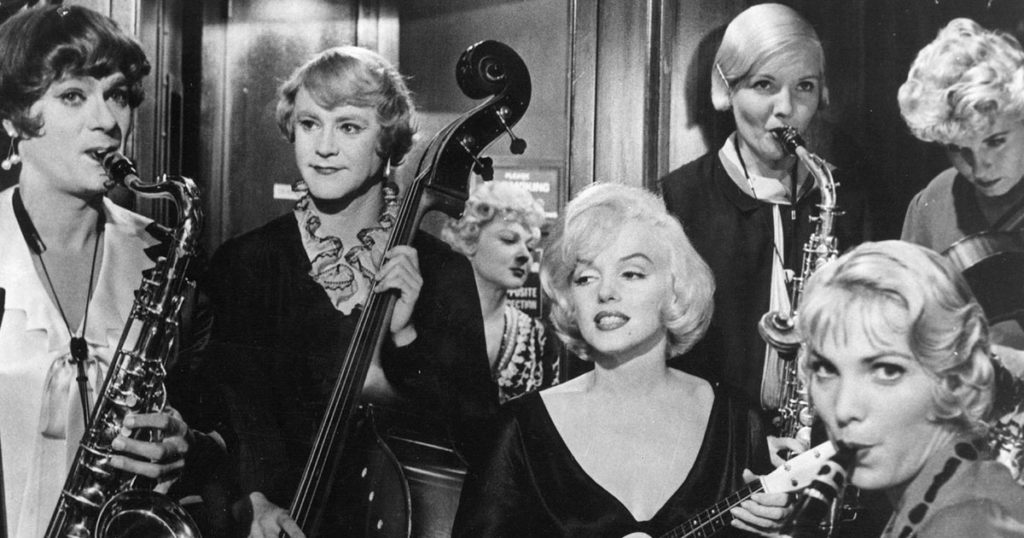
In an effort to be mildly unconventional, this list of songs, soundtracks, and musical moments from cinematic history omits all “best song” Oscar winners (“Over the Rainbow,” “Thanks for the Memory,” “Moon River”), old favorites (“Yankee Doodle Dandy,” “As Time Goes By”), justly celebrated soundtracks (Gone with the Wind, The Godfather, Vertigo, 2001), and numbers performed by Fred Astaire and Ginger Rogers, Gene Kelly, Frank Sinatra, and Judy Garland.
1. “Isn’t it Romantic” (music by Richard Rodgers, lyrics by Lorenz Hart) in Love Me Tonight (1932). This great standard is sung in a musical relay race begun by Paris tailor Maurice Chevalier in his shop and continued by a customer in a top hat, a taxi driver, a composer, a troop of soldiers, and a gypsy band, before reaching princess Jeanette MacDonald in the casement of her palace boudoir. The glamorous melody is whistled, performed as a violin solo, and sung as a show tune, a march, and an aria. You hear the tune in a lot of movies but usually without the words that you get here.
2. “Good Old Charlie Kane” in Citizen Kane (1941). Bernard Herrmann wrote and conducted the score, but for the party scene Orson Welles chose Pepe Guizar’s mariachi song “A Poco No,” which he had heard in Mexico. New lyrics were provided by RKO veteran Herman Ruby. “You buy a bag of peanuts in this town, you get a song written about you,” Kane says, and out comes a boater-wearing, cane-twirling song-and-dance man with a chorus of showgirls to hail the newspaper magnate at the height of his glory.
3. “Put the Blame on Mame, Boys” (music by Allan Roberts, lyrics by Doris Fisher) in Gilda (1946). Anita Ellis’s voice comes out of Rita Hayworth’s mouth as the original love goddess struts her stuff in a strapless black satin gown. The lyric sums up the male anxiety underlying many a film noir.
4. “Too Marvelous for Words” (music by Richard Whiting, lyrics by Johnny Mercer) in Dark Passage (1947). Lauren Bacall tells escaped convict Humphrey Bogart that she loves swing, and to prove it she puts this song on the record player. Who is the singer? Consensus: Jo Stafford (uncredited). It becomes the lovers’ song and is reprised at key moments.
5. “Too Marvelous for Words” as sung by Doris Day in Young Man with a Horn (1950). In this biopic, Kirk Douglas plays Bix Beiderbecke, Harry James plays the trumpet, and Doris Day proves she is one of the best of all big-band vocalists. Here she sings such other standards as “The Very Thought of You” and “With a Song in My Heart,” and the whole soundtrack is grand. I find it irresistible to play Doris’s and Jo Stafford’s versions of “Too Marvelous for Words” back to back, and ask listeners to choose between them.
6. “Street Scene” by Alfred Newman. Written for King Vidor’s 1931 movie of the same title, “Street Scene” enlivens the soundtracks of many movies that are set in New York City. It receives its fullest treatment in the opening of How to Marry a Millionaire (1953).
7. Leonard Bernstein’s powerful soundtrack for On the Waterfront (1954).
8. One virtue of Louis Malle’s Elevator to the Gallows (1958) is Miles Davis’s moody soundtrack. Another is Jeanne Moreau.
9. “I’m Through with Love” (music by Matt Malneck and Fud Livingston, lyrics by Gus Kahn) as sung by Marilyn Monroe in Billy Wilder’s Some Like It Hot (1959). Marilyn is an underrated singer, and here is a great example of her artistry and style.
10. The fourth movement of Franz Schubert’s Trout Quintet is one of the surprises on the soundtrack of Kurosawa’s High and Low (1963), his movie adaptation of one of Ed McBain’s finest police procedurals. A second surprise: the Neapolitan song “O sole mio” (or perhaps Elvis’s version, “It’s Now or Never”).
11. The march Elmer Bernstein wrote for The Great Escape (1963), though not quite as famous as the “Marlboro man” music he wrote for The Magnificent Seven, is equally memorable.
12. “Can’t Take My Eyes Off You” in The Deer Hunter (1978). Frankie Valli’s 1967 hit is playing on the jukebox of the bar where the guys (Christopher Walken, John Cazale, et al.) are drinking beer and playing pool. A few of them hum along, then spontaneously burst into song.
13. Woody Allen’s taste in popular music is a reliable delight in his movies. The all-Gershwin soundtrack for Manhattan (1979) includes “He Loves and She Loves,” “Let’s Call the Whole Thing Off,” “Do-Do-Do,” and “Our Love Is Here to Stay,” not to mention the clarinet glissando that opens “Rhapsody in Blue.”
14. Ennio Morricone’s soundtrack for Once Upon a Time in America (1984), particularly “Deborah’s Theme” and the majestic orchestration of “Amapola.”
15. As in other Stanley Kubrick films, there is a lot of excellent music in Eyes Wide Shut (1999). The “Waltz No. 2” from Shostakovich’s Suite for Variety Orchestra is the highlight.

